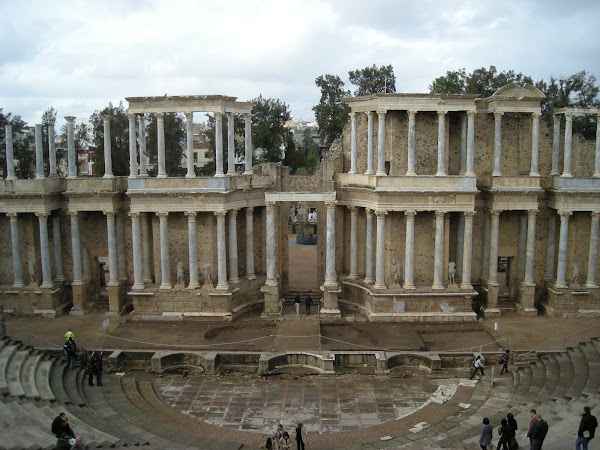Dan sums up my thoughts so eloquently! The following is from Dan's blog:
"So that all happened last weekend: fast-forward to this weekend (the week flew by with writing and writing and more writing, but the details of that activity are by no means worth discussing). This weekend, a couple of friends who are living in Madrid came out to visit us in the quaint countryside, which gave us a rare opportunity to visit a lot of the archaeological sites that I haven't been able to visit and photograph properly since we got here. I am hoping that at least some of the pictures that I took will turn out to be useful, but more importantly, we managed to drag our visitors to nearly every monument in the city in just two days. This is promising news for our Salamantican friends, whose visit later this month will prove a VERY welcome break from my upcoming days of toil and tedium.
See, here in Mérida, and maybe in Spain more generally, they have this thing called a fiesta. Back in the new country, we think of a fiesta as a chance to get together with some of our friends and celebrate. But note that we think of it as a punctual event, which has a finite slot of time (or at least a beginning, with perhaps a more indefinite end in the not-too-distant future) in our busy schedules. Thus, a Friday fiesta will only on the rarest of occasions bleed over into a Sunday afternoon event. By contrast, life in Spain seems to be a single, never-ending fiesta. Sure, people do occasionally go to work in the morning, which interrupts the party for a while, but breakfast comes soon enough, and lasts long enough, to remind them what life's really all about. Just as the average person is getting settled back into the tasks of "work" after desayuno, the clock tower strikes 2 or 2:30 or 3, and off they all scoot to their homes. The lunch section of the fiesta is a pretty serious one (not that desayuno isn't a biologically-mandated necessity, it's just not as intense as lunch), lasting between 2 and 3 hours and including the consumption of large quantities of everything, occasionally followed by a time of rest and relaxtion often referred to as a "siesta" (which I suspect may in fact be a simple mispronunciation of "fiesta"). The lunch hours are often interrupted later in the afternoon by a return to work, but the afternoon work hours are only long enough, as a rule, to inspire a hunger and thirst that can only be quenched on the way home by a visit to a tapas joint. Once the reveler has again staved off immanent starvation, he or she heads for home, where, the hour being advanced beyond 9 pm, dinner is just beginning to materialize. Since it's still just a little too early to dine, perhaps the entire family gathers to roam the streets with the countless other party-goers of the city, window-shopping down the walking streets and spitting their sunflower shells (or tossing their chestnut shells, now that it's the season!) all over the ground. The luckier partiers will arrive in the Plaza de España at just the right time to score an open table at one of the four corner cafes, and will thus be able to kill another hour in anticipation of dinner - over drinks and salty snacks.
So that's life on an average day. But now imagine that you don't have to work at all on Saturday, because it's an official, calendar fiesta. Since that fiesta happens to fall on a Saturday, you naturally can't be expected to have to undergo the pain and suffering of a normal "work day" on Monday, can you? Of course not. Then, imagine that Wednesday is the official fiesta of your town's patron saint, say Santa Eulalia, for example. Why in the world would anyone show up for work on Tuesday, since they've already had Monday off? They wouldn't. So what you're looking at here is a five-day weekend. Not bad, right? That's what I thought, anyway. But as it turns out, I was wrong. You see, the standard work week is really just a series of interruptions that are imposed on the fiesta that comprises real life. So a five-day weekend is really just a return to what should be, whereas the normal two-day weekend is more reasonably a set of concessions designed to prevent the rest of the world discovering how life really ought to be lived."
Subscribe to:
Post Comments (Atom)



No comments:
Post a Comment